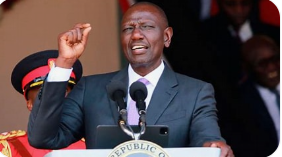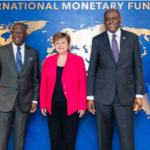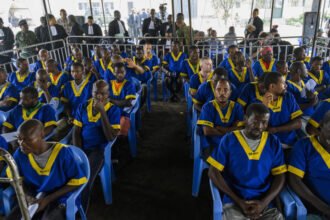By Daniel Niyongabo
Nairobi, Kenya – President William Ruto’s Kenya Kwanza alliance has suffered a significant blow with the Devolution Empowerment Party (DEP), popularly known as ‘Mbus’ due to its bus symbol, officially announcing its departure from the coalition. The move, declared during a press briefing on Friday, April 25th, has sent ripples through the political landscape, with party leaders citing betrayal, exclusion, and a growing sense of disillusionment as the driving forces behind their decision.
Kiraitu Murungi, former Meru Governor and the party’s leading figure, declared DEP a fully independent entity. “The bus party is non-aligned. The bus party is autonomous. The bus party is independent,” Murungi stated, distancing the party from any formal association with Ruto’s United Democratic Alliance (UDA) or any other political formation.
Murungi emphatically stated that DEP had never signed a coalition agreement with any party and is not bound to any political alignment. “We are currently not in any formal coalition with any political party… We have no agreement registered with the registrar of political parties with any party. We don’t have such an agreement with UDA, we don’t have such an agreement with Narc Kenya or any other party… So we stand as an independent party, not in any coalition as of now,” he added.
DEP leaders expressed deep disappointment with the Kenya Kwanza administration, accusing it of consistently ignoring their contributions and showing a lack of interest in addressing the challenges faced by ordinary Kenyans. They alleged being sidelined from key decision-making processes, leading to a feeling of political abandonment.
DEP Chairman and former Embu Senator Lenny Kivuti echoed these sentiments, revealing that the party had been systematically ignored since the elections. “There has never been any signed agreement between our party and any other party,” Kivuti stated. “Maybe we may seem to work together with any party, but so far we have not signed an agreement with any party.”
Both leaders emphasized that the party’s constitution prohibits merging with any other party, though it allows for coalitions with compatible political outfits. However, they made it clear that joining any coalition is not a current priority. The question of who DEP will support in the 2027 polls remains unanswered.
With renewed energy, DEP is now focused on reclaiming its political relevance, starting with the upcoming Mbeere North parliamentary by-election. The party announced it will field a candidate and vigorously campaign to win the seat and cement its presence at the grassroots level.
“We shall leave no stone unturned to make sure that our Bus Party wins the Mbeere North parliamentary seat when the by-elections for the seat are held,” Kivuti noted. “We shall consider collaborating with like-minded party or parties which respect and value us.”
Looking ahead, Kivuti added that DEP plans to field candidates in all elective seats across the country during the 2027 General Election, with immediate efforts focused on membership recruitment, political education, and leadership development. The departure of DEP marks a significant challenge for the Kenya Kwanza coalition, forcing it to re-evaluate its relationship with other constituent parties and address the concerns raised by the outgoing ‘Mbus’ party.









